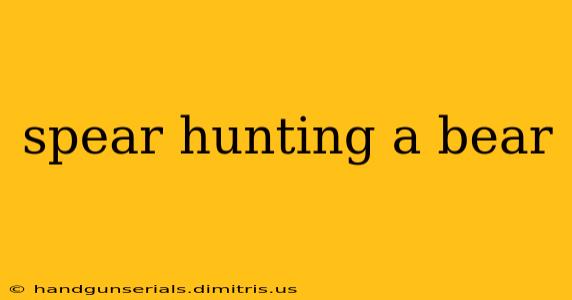Spear hunting, a practice steeped in history, presents a unique set of challenges and ethical considerations, especially when the target is a bear. This pursuit is not for the faint of heart; it demands an unparalleled level of skill, experience, and respect for the animal. This article will explore the realities of spear hunting bears, highlighting the immense risks involved and the crucial ethical considerations that must be paramount.
The Extreme Risks of Spear Hunting Bears
Let's be clear: spear hunting a bear is incredibly dangerous. Unlike firearms, a spear offers limited range and requires extremely close proximity to the animal. A miss, or even a poorly placed hit, can result in a severely injured bear, leading to a potentially fatal confrontation for the hunter. Bears possess immense strength, sharp claws, and teeth capable of inflicting devastating injuries. The hunter's survival depends entirely on their skill, preparation, and a significant element of luck.
Physical Demands and Skill
Success hinges on precise spear throws, impeccable timing, and the ability to anticipate the bear's movements. The hunter must possess exceptional physical fitness, stamina, and the nerve to remain calm under extreme pressure. Years of experience with hunting and potentially spear throwing are essential; this is not a pursuit for beginners.
Choosing the Right Spear
The spear itself is a critical component. The length, weight, and point design must be carefully considered based on the type of bear being hunted and the hunting environment. A robust, well-balanced spear crafted from high-quality materials is crucial for penetration and staying power.
Ethical Considerations: A Moral Imperative
Beyond the physical risks, spear hunting bears raises significant ethical questions. The close-range nature of this hunting method demands a high level of precision to ensure a quick, clean kill to minimize the animal's suffering. Failure to achieve this can lead to prolonged pain and distress for the bear.
Respect for the Animal
Ethical spear hunting requires a deep respect for the bear's power and place in the ecosystem. It’s not a sport; it's a serious undertaking demanding careful consideration of the animal's welfare and the impact on the local population.
Sustainable Hunting Practices
Responsible hunting practices are vital to ensure the long-term survival of bear populations. Overhunting can drastically reduce numbers, disrupting the delicate balance of the ecosystem. Strict adherence to regulations and quotas, combined with a commitment to ethical hunting practices, is crucial.
Alternatives to Spear Hunting
Given the inherent dangers and ethical complexities, it is crucial to consider alternatives to spear hunting bears. Other hunting methods, such as bow hunting or firearm hunting, while still requiring a high degree of skill and respect, offer greater safety margins and potentially a quicker, more humane kill.
Conclusion: A High-Risk, High-Reward Pursuit
Spear hunting a bear is a challenging, potentially life-threatening endeavor that demands the utmost skill, respect, and preparedness. The ethical considerations must be carefully weighed against the risks involved. While the tradition of spear hunting holds historical significance, the modern hunter should carefully assess the potential consequences before engaging in this extreme pursuit. Alternatives exist, and the well-being of the animal should always be paramount.

